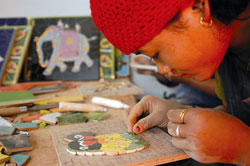|
|
Amid broken pieces of glittering bathroom tiles and small piles of brown dust, Sabitri Gurung is hard at work. She selects a tile from the pile beside her, cuts it into shape using pliers and smoothens out the rough edges with sandpaper.
She looks down at the half-finished mosaic of a gecko, unable to decide where to place her piece. Nineteen-year old Reena notices her and walks over, and with hand motions, explains to Sabitri what she should do. Sabitri is speech- and hearing-impaired. She nods in agreement, and then turns back to her gecko.
"I want to earn my own money," signs Sabitri, who left school in grade one because she had difficulty understanding the teacher. She went to Kathmandu for a one-year vocational course in sewing and learned to stitch, sew and darn. She even got herself a sewing machine. But after the course, she couldn't find even one person who would hire her.
"The hearing-impaired are taught tailoring and sewing but that doesn't help them because no one wants to go to a deaf tailor," says Philip Holmes, whose charity, the Esther Benjamins Trust, has been supporting the local deaf school here since 1999.
"Mosaics and art work are a better alternative." In Kathmandu, many speech- and hearing-impaired apply to the Bakery Caf? chain as waiters, but there is no such option in Bhairawa.
"There used to be a garment factory where our graduates worked," says Bal Kumari Gurung, principal of the school. "But now, even that has closed down."
It is only few weeks since Holmes started the course and there are already 26 participants, mostly female. The teachers, Reena, 19 and Manju, 20 are from Holmes' Kathmandu-based Himalayan Mosaics, a non-profit organisation which employs girls rescued from Indian circuses (see'Artistic healing', #341).
Reena and Manju are both former circus children. Just a year ago, they were the ones learning to coordinate colours and cut shapes but now, they're doing the teaching. "I've become independent making mosaics and now I want others to learn what I know," says Manju.
What started out as above all a philanthropic scheme for vulnerable girls has now mushroomed into a full-fledged business. Himalayan Mosaics employs 17 young women and 20 more are in training at Holmes' former residence in Godavari. In addition to making mosaics, the girls are now learning pottery and sculpting. Once the hearing-impaired in Bhairawa complete their training, they too will become part of Himalayan Mosaics, earning a commission for every mosaic they make.
The Bhairawa workshop is bright and specks of dust hang suspended in the sunlight filtering through the windows. Talk is muted between the two teachers and the only other sounds are the snapping of pliers and the clink of bathroom tiles. Reena and Manju hover over those working, like mothers fussing over their children.
From shy children, these two have matured into confident teachers. Says Reena: "While making mosaics, everything falls into place, you don't think about anything else. It will help them in the same way it has helped us."
Himalayan Mosaics is conducting a sale of the mosaics at the Summit Hotel, 22-23 March, 10AM-5PM. www.ebtrust.org.uk



